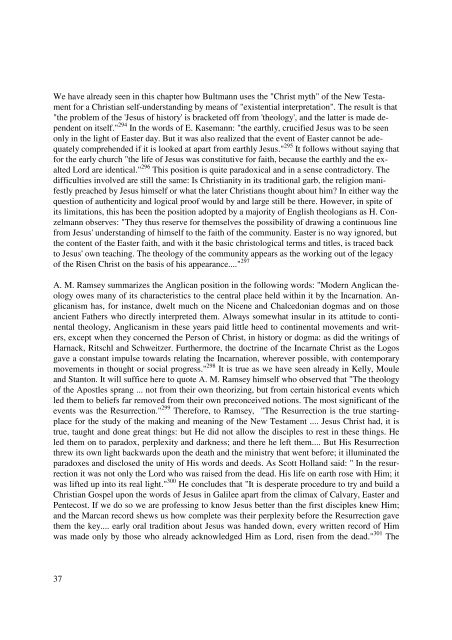Scripture and God in Christianity
Scripture and God in Christianity
Scripture and God in Christianity
You also want an ePaper? Increase the reach of your titles
YUMPU automatically turns print PDFs into web optimized ePapers that Google loves.
We have already seen <strong>in</strong> this chapter how Bultmann uses the "Christ myth" of the New Testament<br />
for a Christian self-underst<strong>and</strong><strong>in</strong>g by means of "existential <strong>in</strong>terpretation". The result is that<br />
"the problem of the 'Jesus of history' is bracketed off from 'theology', <strong>and</strong> the latter is made dependent<br />
on itself." 294 In the words of E. Kasemann: "the earthly, crucified Jesus was to be seen<br />
only <strong>in</strong> the light of Easter day. But it was also realized that the event of Easter cannot be adequately<br />
comprehended if it is looked at apart from earthly Jesus." 295 It follows without say<strong>in</strong>g that<br />
for the early church "the life of Jesus was constitutive for faith, because the earthly <strong>and</strong> the exalted<br />
Lord are identical." 296 This position is quite paradoxical <strong>and</strong> <strong>in</strong> a sense contradictory. The<br />
difficulties <strong>in</strong>volved are still the same: Is <strong>Christianity</strong> <strong>in</strong> its traditional garb, the religion manifestly<br />
preached by Jesus himself or what the later Christians thought about him? In either way the<br />
question of authenticity <strong>and</strong> logical proof would by <strong>and</strong> large still be there. However, <strong>in</strong> spite of<br />
its limitations, this has been the position adopted by a majority of English theologians as H. Conzelmann<br />
observes: "They thus reserve for themselves the possibility of draw<strong>in</strong>g a cont<strong>in</strong>uous l<strong>in</strong>e<br />
from Jesus' underst<strong>and</strong><strong>in</strong>g of himself to the faith of the community. Easter is no way ignored, but<br />
the content of the Easter faith, <strong>and</strong> with it the basic christological terms <strong>and</strong> titles, is traced back<br />
to Jesus' own teach<strong>in</strong>g. The theology of the community appears as the work<strong>in</strong>g out of the legacy<br />
of the Risen Christ on the basis of his appearance...." 297<br />
A. M. Ramsey summarizes the Anglican position <strong>in</strong> the follow<strong>in</strong>g words: "Modern Anglican theology<br />
owes many of its characteristics to the central place held with<strong>in</strong> it by the Incarnation. Anglicanism<br />
has, for <strong>in</strong>stance, dwelt much on the Nicene <strong>and</strong> Chalcedonian dogmas <strong>and</strong> on those<br />
ancient Fathers who directly <strong>in</strong>terpreted them. Always somewhat <strong>in</strong>sular <strong>in</strong> its attitude to cont<strong>in</strong>ental<br />
theology, Anglicanism <strong>in</strong> these years paid little heed to cont<strong>in</strong>ental movements <strong>and</strong> writers,<br />
except when they concerned the Person of Christ, <strong>in</strong> history or dogma: as did the writ<strong>in</strong>gs of<br />
Harnack, Ritschl <strong>and</strong> Schweitzer. Furthermore, the doctr<strong>in</strong>e of the Incarnate Christ as the Logos<br />
gave a constant impulse towards relat<strong>in</strong>g the Incarnation, wherever possible, with contemporary<br />
movements <strong>in</strong> thought or social progress." 298 It is true as we have seen already <strong>in</strong> Kelly, Moule<br />
<strong>and</strong> Stanton. It will suffice here to quote A. M. Ramsey himself who observed that "The theology<br />
of the Apostles sprang ... not from their own theoriz<strong>in</strong>g, but from certa<strong>in</strong> historical events which<br />
led them to beliefs far removed from their own preconceived notions. The most significant of the<br />
events was the Resurrection." 299 Therefore, to Ramsey, "The Resurrection is the true start<strong>in</strong>gplace<br />
for the study of the mak<strong>in</strong>g <strong>and</strong> mean<strong>in</strong>g of the New Testament .... Jesus Christ had, it is<br />
true, taught <strong>and</strong> done great th<strong>in</strong>gs: but He did not allow the disciples to rest <strong>in</strong> these th<strong>in</strong>gs. He<br />
led them on to paradox, perplexity <strong>and</strong> darkness; <strong>and</strong> there he left them.... But His Resurrection<br />
threw its own light backwards upon the death <strong>and</strong> the m<strong>in</strong>istry that went before; it illum<strong>in</strong>ated the<br />
paradoxes <strong>and</strong> disclosed the unity of His words <strong>and</strong> deeds. As Scott Holl<strong>and</strong> said: " In the resurrection<br />
it was not only the Lord who was raised from the dead. His life on earth rose with Him; it<br />
was lifted up <strong>in</strong>to its real light." 300 He concludes that "It is desperate procedure to try <strong>and</strong> build a<br />
Christian Gospel upon the words of Jesus <strong>in</strong> Galilee apart from the climax of Calvary, Easter <strong>and</strong><br />
Pentecost. If we do so we are profess<strong>in</strong>g to know Jesus better than the first disciples knew Him;<br />
<strong>and</strong> the Marcan record shews us how complete was their perplexity before the Resurrection gave<br />
them the key.... early oral tradition about Jesus was h<strong>and</strong>ed down, every written record of Him<br />
was made only by those who already acknowledged Him as Lord, risen from the dead." 301 The<br />
37
















